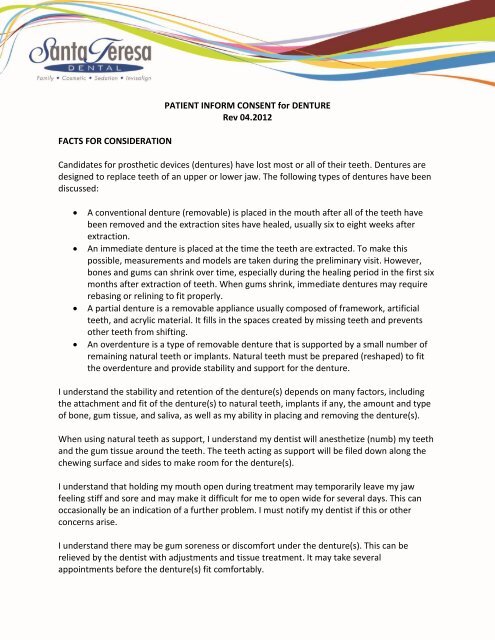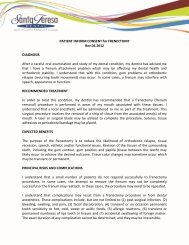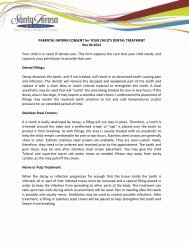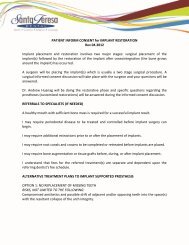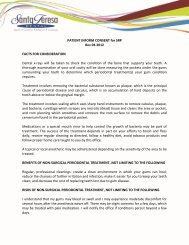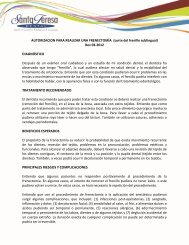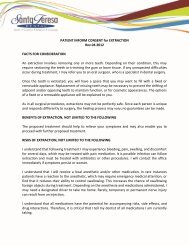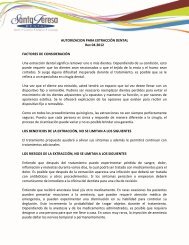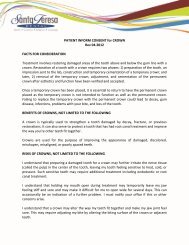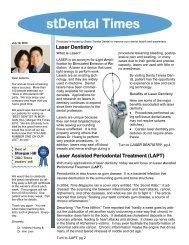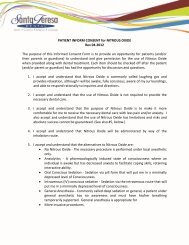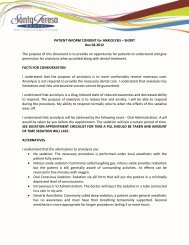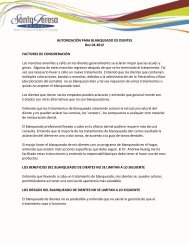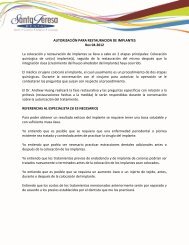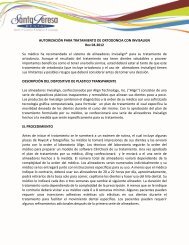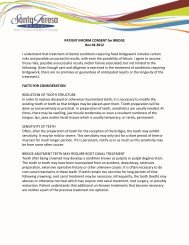Denture - Consent Form
Denture - Consent Form
Denture - Consent Form
You also want an ePaper? Increase the reach of your titles
YUMPU automatically turns print PDFs into web optimized ePapers that Google loves.
FACTS FOR CONSIDERATION<br />
PATIENT INFORM CONSENT for DENTURE<br />
Rev 04.2012<br />
Candidates for prosthetic devices (dentures) have lost most or all of their teeth. <strong>Denture</strong>s are<br />
designed to replace teeth of an upper or lower jaw. The following types of dentures have been<br />
discussed:<br />
� A conventional denture (removable) is placed in the mouth after all of the teeth have<br />
been removed and the extraction sites have healed, usually six to eight weeks after<br />
extraction.<br />
� An immediate denture is placed at the time the teeth are extracted. To make this<br />
possible, measurements and models are taken during the preliminary visit. However,<br />
bones and gums can shrink over time, especially during the healing period in the first six<br />
months after extraction of teeth. When gums shrink, immediate dentures may require<br />
rebasing or relining to fit properly.<br />
� A partial denture is a removable appliance usually composed of framework, artificial<br />
teeth, and acrylic material. It fills in the spaces created by missing teeth and prevents<br />
other teeth from shifting.<br />
� An overdenture is a type of removable denture that is supported by a small number of<br />
remaining natural teeth or implants. Natural teeth must be prepared (reshaped) to fit<br />
the overdenture and provide stability and support for the denture.<br />
I understand the stability and retention of the denture(s) depends on many factors, including<br />
the attachment and fit of the denture(s) to natural teeth, implants if any, the amount and type<br />
of bone, gum tissue, and saliva, as well as my ability in placing and removing the denture(s).<br />
When using natural teeth as support, I understand my dentist will anesthetize (numb) my teeth<br />
and the gum tissue around the teeth. The teeth acting as support will be filed down along the<br />
chewing surface and sides to make room for the denture(s).<br />
I understand that holding my mouth open during treatment may temporarily leave my jaw<br />
feeling stiff and sore and may make it difficult for me to open wide for several days. This can<br />
occasionally be an indication of a further problem. I must notify my dentist if this or other<br />
concerns arise.<br />
I understand there may be gum soreness or discomfort under the denture(s). This can be<br />
relieved by the dentist with adjustments and tissue treatment. It may take several<br />
appointments before the denture(s) fit comfortably.
I understand the new denture(s) may feel awkward for a few weeks until I become accustomed<br />
to them, and the denture(s) may feel loose while my cheek muscles and tongue learn to keep<br />
them in place.<br />
I understand my dentist will make every attempt to create a natural appearance for the<br />
denture(s); however, it may not be possible for the denture(s) to support my lip and facial<br />
contours perfectly.<br />
I understand eating with the denture(s) will require practice. My dentist has recommended I<br />
start with soft foods cut into small pieces and chew slowly, using both sides of my mouth at the<br />
same time, to prevent the denture(s) from tipping. I understand I need to be cautious when<br />
eating chewy, hot, or hard foods (for example: apples, popcorn, raisins, candy).<br />
I understand that pronouncing certain words may take practice. I can do this by reading aloud<br />
and repeating troublesome words. Sometimes the denture(s) will slip when I laugh, cough, or<br />
smile. I can reposition the denture(s) by gently biting down and swallowing. If a speaking<br />
problem persists, I will call my dentist for consultation.<br />
Similar to natural teeth, I understand that my denture(s) require daily brushing to remove food<br />
deposits and plaque. My dentist has explained to me how best to care for my denture(s) and<br />
which products to use. I have to brush my gums, tongue, and palate with a soft bristled brush<br />
before wearing my denture(s). If I do not properly clean or care for my denture(s), they may<br />
stain, develop odor, and affect the way food tastes.<br />
I understand that any adjustments I make to my denture(s) can compromise the denture(s) and<br />
cause gum and cheek irritation and sores. If my denture(s) become loose, chip, crack, or break, I<br />
will contact my dentist immediately. Glue bought over-the-counter to repair a broken denture<br />
often contains harmful chemicals and should not be used on dentures. Adjusting my denture(s)<br />
on my own is not advised and may result in permanent changes to the denture(s) that affect<br />
their fit and function. This may also result in the need to remake the denture, which I<br />
understand will be at my own expense.<br />
I understand that I am required to keep regular care appointments with my dentist to maintain<br />
good oral health and ensure my denture(s) retain their proper fit and function.<br />
I understand that every reasonable effort will be made to ensure the success of my treatment.
BENEFITS OF DENTURE, NOT LIMITED TO THE FOLLOWING<br />
I understand that a reasonable aesthetic appearance may be achieved.<br />
With dentures, I understand my function and ability to eat will improve as opposed to being<br />
edentulous (without teeth).<br />
RISKS OF DENTURE, NOT LIMITED TO THE FOLLOWING<br />
I understand that there are potential problems such as: periodontal (gum) disease, porcelain<br />
fractures, occlusal (bite) changes, stains and color changes, gum recession, food impaction,<br />
decay, excessive wear due to grinding and bruxing, temporomandibular joint dysfunction<br />
(TMD), and others.<br />
I understand that dentures may have characteristics and potential problems, such as: odor,<br />
chipping, and wear; stability and retention problems; changes in facial and lip appearance; and<br />
adaptation of the tongue and lips for proper speech. Periodic relines may be required as gum<br />
and bone may change over time, oral sensations may change, and good oral hygiene is<br />
imperative.<br />
I understand poor fitting dentures can cause constant irritation over a long period and may<br />
contribute to the development of sores. Failure to wear my denture(s) over a long period of<br />
time may affect the fit of the denture(s). My denture(s) may need to be relined or replaced. If<br />
my denture(s) begin to feel loose or cause pronounced discomfort, I will contact my dentist.<br />
I understand a numb lip may occur from the pressure of the removable denture(s). This<br />
problem requires selective adjustment and in rare cases, a nerve might need surgical<br />
repositioning.<br />
I understand that the edge of the denture(s) usually rests on the gumline, which is in an area<br />
prone to gum irritation, infection, or decay. Proper hygiene at home, a healthy diet, and regular<br />
professional cleanings are some preventative measures essential to control these problems.
CONSEQUENCES IF NO TREATMENT IS ADMINISTERED ARE NOT LIMITED TO THE FOLLOWING<br />
I understand that I can choose to do nothing and my present complaints will continue and may<br />
worsen. Subsequent choices for dentition repair may become more difficult, expensive, or not<br />
feasible.<br />
I understand if I do not replace missing teeth, I risk compromised aesthetics and possible drift<br />
of adjacent and/or opposing teeth into the space(s) with the resultant collapse of the arch<br />
integrity. This could also create or exacerbate a temporomandibular problem.<br />
TREATMENT PROCESS<br />
I understand the following timeline represents an estimate of the treatment proposed by my<br />
dentist. It is important that I keep appointments within close succession of the estimated<br />
timeline, or I risk compromising the entire treatment plan.<br />
Exam, shade, mold selection, and impression - today<br />
Mouth preparation, surgical adjustment - per individual case<br />
Try-in wax adjustment - 2 weeks after impression<br />
Adjustment and delivery - 2 weeks after try-in<br />
ALTERNATIVES TO DENTURES, NOT LIMITED TO THE FOLLOWING<br />
I understand that depending on the reason I am a candidate for dentures, alternatives may<br />
exist, Including the use of dental implants to support the denture. I have asked my dentist<br />
about them and their respective expenses. My questions have been answered to my<br />
satisfaction regarding the procedures and their risks, benefits, and costs.<br />
No guarantee or assurance has been given to me by anyone that the proposed treatment or<br />
surgery will cure or improve the condition(s) listed above.<br />
I have been given the opportunity to ask questions and give my consent for the proposed<br />
treatment as described above.


